- Home
- Gail Carriger
Meat Cute
Meat Cute Read online
MEAT
CUTE
THE HEDGEHOG INCIDENT
Gail Carriger
Wait, what am I reading?
From the comedic mind of New York Times bestseller Gail Carriger comes the much requested prequel short story to Soulless.
In Meat Cute, Alexia Tarabotti attends what seems to be a very dull London party, until the new werewolf Alpha turns up, Lord Conall Maccon. He is unconscionably rude to her and sits on a hedgehog.
Gail has a fun, silly newsletter full of gossip, sneak peeks, and giveaways. Join The Chirrup
A Note On Chronology
Set in the spring of 1872 this story occurs just prior to events chronicled in The Parasol Protectorate series featuring this couple (Soulless, Changeless, Blameless, Heartless, Timeless) and after those in Defy or Defend. Alexia also appears briefly in Romancing the Inventor, and Conall is referenced in The Finishing School series.
CONTENTS
About Meat Cute
A Note on Chronology
Meat Cute
Poison or Protect Excerpt
Author’s Note
Acknowledgements
Want More Gail Carriger?
About the Writerbeast
Copyright
Meat Cute
The Hedgehog Incident
April 1872
The chaperone and the footman walked together down the dingy alleyway towards the house party. It was not an alley where staff should be seen walking. Frankly, it was not an alley where anyone should be seen walking, except perhaps drunkards and the occasional stray cat.
Add to that the fact that they were an incongruous pair, the chaperone and the footman, and no doubt eyebrows would have been raised had anyone seen them. No one did. Which was as they intended. All eyebrows were assured normal resting position.
The footman was a young man, barely eighteen, with a sweet, open countenance and mahogany-dark skin. He looked gentle and rather kind, but he moved like a predator. This gave the impression of the type of man who most likely would make you laugh right before he oh so efficiently killed you. With minimal blood loss, no stains to the carpet, and copious apologies. But still, death.
The chaperone was an older woman, with dull grey hair stuffed severely under a cap and a gown that did her no favors. The dress was a faded salmon silk with yellow lace trim some five years out of style. It had too many orange ruffles at the hem and neck, adding to its bulk and misery. Frumpy, dumpy, and like words instantly sprang to mind. She moved as though she were half her own age, her steps light and arrogant, until they were within sight of their target house. Then, suddenly, her posture shifted. She curled in upon herself until her gait matched her age and her expression became one of parsimony and judgment perfectly suited to the shabby state of her Sunday best. She was someone’s maiden aunt, easily dismissed and best forgotten.
Creatures of the shadows inhabit all levels of society and some of them work hard not to be observed.
The footman took note of his companion’s reduced pace and slumped posture.
“You are a shifter, my heart, in your way.” He slowed to match her pace.
The companion gave him a slow blink, her version of approval. Her voice, when it emerged, was not her true low, musical timbre. It was roughened, as if by drink and time. “There is something else I’ll need to do, while we’re in there.”
“There is always something else.” He looked concerned. He was not so good at hiding his feelings as she. “Are you playing two hands tonight?”
“No. I’m loyal to our employer. This time. There is another matter in which I have an interest. A match to arrange.”
“Dangerous?”
“Not for me.”
No help with that observation. She would say that about most things. It was true, though. Nine times out of ten, she was the most dangerous thing in the room.
The footman smiled to himself. Even when we’re in that room together, and me a werewolf, I’d lay the odds in her favor.
He pressed her gently for more. “Are the parties in question aware of our connections?”
“No. Nor will they be. This is not that kind of match.”
“Is it connected to our official task?”
“It is.”
“You know you cannot actually kill two birds with one stone?”
“True, but I can disturb two werewolves with one soulless.”
The footman frowned. This was already a delicate business. One match was enough per evening, especially when werewolves were involved.
“And this will help.” She raised her chaperone’s basket. It was a wicker affair, largish and round, with a tight weave to disguise its contents. It might contain any manner of things, including the expected supplies of a maiden aunt, such as needle and thread and smelling salts. Of course, the spools of thread would be garrotes and the salts more deadly than reviving.
She lifted the lid and a wiggly pink nose poked out inquisitively.
“A hedgehog?” He was startled, then pleased. He should be used to the sensation, but it delighted him that after so many years, she still surprised him. Which, to an immortal, also meant joy.
“Two hedgehogs. Just in case.”
“In case what?”
“The first one doesn’t work.”
She closed the lid. He realized then that the basket was shaped like a chicken.
“You’re a hedgehog smuggler. A chicken transport hedgehog smuggler.”
“Someone has to be.”
“Do they indeed?”
Her face was very bland. “Yes.”
He hid his grin. “I adore you, you know.”
Her face was even more bland. “Yes.”
The swell of warmth was infinite, that she accepted them together so readily – he had never learned to take that for granted. He hoped he never would.
“Do we anticipate other players?” He returned them to the business at hand.
“Not as such. I will need to make use of Winston.”
The footman’s face lost a little of its perennial cheer. “Are you sure that’s wise? We wouldn’t want to jeopardize the mission.”
“It is not so complicated as to be beyond his abilities. Nor is managing him beyond mine.” There was no pride in her statement, simply truth.
“Very little is, my heart. It doesn’t mean you must do a thing, simply because you can.”
“Oh, in this instance I think I must.” She flashed him a smile then.
It was the small, tight, vicious smile that he loved with all that was left of his soul. It was the one that said she was being careful, and wicked, and arranging the world to her exact specifications. He, like the world, was pierced by the sharp anticipation of it, eager to see what she could do, for she did it so very beautifully.
He let himself smile in reply. Showing his joy and pride in her secrecy, for only he would know that it was his lady who had arranged it all. The privilege of the shadows. His privilege.
“You know I will help you,” he said.
“I never doubted it for a moment.”
Alexia Tarabotti would not be moved from the punch bowl. She had selected her station for the evening and would wallflower there with the best of them. She should be good at it by now; it was all she ever did at a party. And in this instance, as it was remarkably tasty punch, any relocation seemed fraught with fruitlessness.
The gathering, it must be said, was a failure, like so many of Alexia’s evenings of late. Certainly not by their host’s standards, for in that respect it was a veritable crush. The large house was stuffed near to bursting with beautiful dresses, fine manners, and mild insults. The card-room emitted the requisite cigar smoke, impolitic politics, and raucous mas
culine laughter. The string quartet tinkled encouragingly in the ballroom, where gentlemen obliged young ladies of superior fashion and ignored Alexia Tarabotti.
From her position by the punch, Alexia could see that her sisters were having a lovely time. Or perhaps one might say that they were putting on a terribly decent show of having a lovely time. They fluttered their eyelashes at dance partners, they giggled encouragingly at witticisms, and they waved fans in tolerably flirtatious code. They were not so wealthy as to attract throngs of admirers, but they did very well for themselves by solidly representing the gentry as only the most vapid could. Their dresses were very pretty and modish; Felicity’s of pale blue and yellow with plenty of rosettes, and Evylin’s of white and pink with a number of bows. No doubt there were the same number of bows as there were rosettes or words would have been exchanged. They flitted, like sinister butterflies, from refreshment alcove to music room to dance floor, alighting upon each for the exact amount of time society dictated and no more.
Miss Tarabotti, on the other hand, stayed by the punch and wished for something stronger. Not that she knew what something stronger might taste like, or do to her, but when one was faced with the burden of two sisters flitting, one felt the burning desire for a beverage that burned on the way down. The gentlemen in the card-room always seemed to have the most jovial time at any society gathering. Alexia refused to believe this was the result of either the gentlemen (who were merely older imitations of the ones forced to dance, and thus insipid at best and boorish at worst) or the cards, so it must be the brandy that so often accompanied the smoking.
Alexia thought she might quite like brandy. It might help her to cope with her own dress, which was also modish (because Alexia’s mother couldn’t countenance being thought mean) but profoundly unflattering. Mrs Loontwill, Alexia’s mother, had been told that her eldest daughter ought to wear bright colors and seemed to have decided as a result that Alexia ought to wear them all together at once. Her dress was cerulean blue, which would’ve been fine, except that the scalloped edges were trimmed first in marigold yellow, and then in black lace. Given that Alexia was dark of hair and skin and eyes, the dress did her no favors, and made her feel not unlike a circus performer or a stage actress.
When I am an old spinster, she thought, I shall wear nothing but jewel tones and drink all the brandy I like. Then she corrected herself. When I am an older, independent spinster. By society’s standards she was long in the tooth and on the shelf already, the color of the dress only helping to make this point, even if punch-based land occupation and wallflower status had not.
She glanced up from a thorough examination of her yellow gloves, which she held in one hand so that she might drink punch with the other, and noticed that her mother was heading in her direction. Desperately, she cast about, hoping for salvation.
But this was a house party. No salvation was to be had here for an unwed girl in her mid-twenties.
“Alexia, there you are,” said Mrs Loontwill, lips scrunched as if she had eaten something bitter.
“Here, as you say, I am. Precisely where you left me, Mother.”
“Oh, why must you be so difficult?” Mrs Loontwill swished her own dress as she drew to a stop before Alexia and tapped one gloved hand with her fan.
Mrs Loontwill had made no allowances for her own age with her gown, which much resembled those of her younger daughters. It was cream and lavender and festooned with yellow silk peonies. Alexia had no doubt that there were twice as many peonies on her mother’s gown as there were bows on Evylin’s or rosettes on Felicity’s.
“May I help you, Mother?”
“Why couldn’t you have learned to play? Young ladies without other attributes ought to develop a demonstrable skill. I would even have accepted singing. Perhaps opera. You have the physique of a leading soprano.”
“Mother,” said Alexia, keeping her tone as civil as possible under the circumstances, “no one, and I do mean no one, wishes to hear me sing. As to the other, it was you who fired our only capable governess, remember?”
“I’ve no idea what you’re intimating. You might have taught yourself to play the harp or something dignified like that. It worked with reading.”
Alexia looked past her mother at the dance floor in simulated interest. “You know perfectly well that I can never do anything creative or artistic. It’s not in my nature.”
Mrs Loontwill sneered at her eldest. “So like your father. Honestly, what did I see in that man?”
Alexia was genuinely interested. “I’ve no idea – what did you?”
Mrs Loontwill looked around to ascertain if they were observed. They were not and they’d drifted away from the punch bowl. “He was rather handsome. But what is swarthy and brooding and exotic in a man of his caliber is unfortunate in a girl of yours.”
Alexia tried very hard not to roll her eyes. Her eyes strained under the effort. “So kind, as always, Mother.”
“Well, I do wish you were a touch more normal, dear.” Mrs Loontwill actually attempted to make her tone sympathetic.
“Careful, you might hurt yourself trying to be nice to me.”
Mrs. Loontwill sniffed. “I want you on your best behavior. And for heaven’s sake, where are your gloves?”
Alexia waggled them at her. “I was drinking punch. I cannot leave my gloves on for that.”
“Well, stop drinking anything and put them on, dear, do. We can’t have you touching anyone unexpectedly.”
Alexia looked around at the assembled quality. There was, perhaps, a minor lordling or two in attendance, but most of those present were solid gentry like themselves, no one of truly exalted rank. “Why? Are we expecting vampires?”
“Oh no, dear, no. Nothing so important as all that. But there was talk of perhaps, you understand, the gentlemen of a more hirsute nature giving this humble gathering a look-in.”
“Werewolves? Really? How very disturbing.” Alexia Tarabotti had lived in London all her life, and she had been out since she turned sixteen – perhaps a bit young, but her mother was anxious to see her married. Not that it had worked. Almost a decade later and she was firmly on the shelf. She had been too much, even at sixteen, for most gentlemen to handle: too willful in her manners, too direct in her address, too tan, too tall, too curvy. Too much. And that was without telling anyone of her preternatural affliction. Age had only intensified the too much-ness.
But in all her Seasons spent milling about garden parties and balls, picnics and house calls, horse races and cricket matches, Alexia had yet to actually, formally, meet a werewolf. In the proper way of things. By introduction. She’d been around them, of course. At the occasional high quality party where she circled the dainty sandwiches with the other wallflowers, and werewolves circled the dance floor with the other predators.
But as this was a small gathering by London standards, it might afford her the opportunity to actually speak with a werewolf face to face. Not that she wanted such a thing, of course. Werewolves in London always struck her as rather ominous. But she should like to know she could stand up to conversation with one and maintain her dignity. That was assuming her mother’s information was accurate rumor and not hopeful speculation.
“Loners?” she asked her mother.
“What, dear?” Mrs Loontwill’s attention was caught by something across the room. No doubt something her sisters were doing well, rather than something – everything – that Alexia was doing poorly.
“The werewolf guests, are they pack or loners?”
“Don’t be crass, dear.”
Alexia did roll her eyes this time. “It’s not crass to ask after a supernatural’s station, Mother.”
“Isn’t it? I suppose you’d march right up to a vampire in the street and demand his hive or rove status now, would you?”
Alexia couldn’t respond to such an outrageous statement. To start with, a vampire was never to be found wandering the street.
“Oh Mother, d
on’t talk nonsense.”
Mrs Loontwill fluttered a hand. “Hush now, girl. Look, there they are now.”
Alexia hated to admit it, but her mother seemed to be in possession of accurate information. They were without a doubt currently in the presence of werewolves.
A group of gentlemen entered the room. The largish ballroom suddenly seemed not so very large. There were only five of them, but they managed to occupy more than their fair share of space and attention, especially one particular gentleman, front and center. He seemed compelled to suck a young lady’s breath away via the crass application of impossibly broad shoulders and an absurdly aggressive glower.
Alexia Tarabotti glowered back.
Not that he noticed her, but there was a principle in play.
The newcomers were all dressed to the height of fashion, although the glowerer in the middle was a tiny bit rumpled. They were all very big, although the one to the far right was smaller and seemed quietly amused by everyone’s reactions to his compatriots.
The crowd had, indeed, reacted. A collective inhalation, not quite a gasp. Titillation and horror and, of course, fear rippled through the assembly. For there was no way around the fact that they were now being confronted by predators, socially and physically, and for one stomach-churning moment everyone in that room felt hunted.
Everyone except, of course, Alexia Tarabotti.
She was caught counter-glowering by the smallest werewolf. He met her frown with subdued glee and gave her a sardonic little bow. He looked faintly familiar.
The big one, the leader, who must also be the Alpha, turned his frown upon Alexia then, his attention homing in on his pack mate’s small acknowledgement.
Lord Maccon, Earl of Woolsey. It had to be. The relatively new Alpha, come from Scotland to infiltrate London society. Or so the gossip went. He looked more inclined to conquer London at the moment. And possibly set it on fire after pillaging it of every single meat pie.
Or something.
His eyes were fierce and tawny brown, almost yellow. Alexia met them without fear. She was no maiden on the marriage mart to lower her lashes and blush. She was no prey animal, either. He had to know of her existence in his city. BUR would’ve informed him the moment he established residence. The Bureau of Unnatural Registry had kept close tabs on Alexia Tarabotti since birth. A preternatural in their midst. A soulless female, a rarity, a strange kind of threat… or a useful kind of weapon.

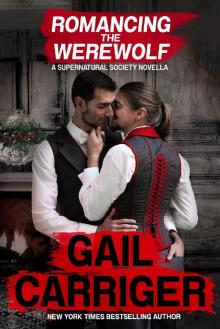 Romancing the Werewolf
Romancing the Werewolf Romancing the Inventor
Romancing the Inventor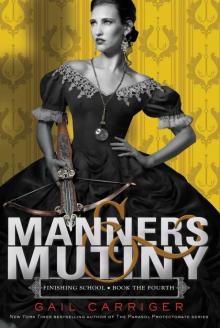 Manners & Mutiny
Manners & Mutiny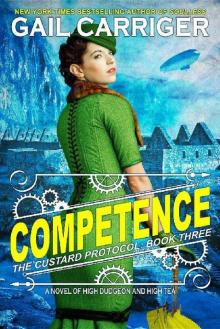 Competence
Competence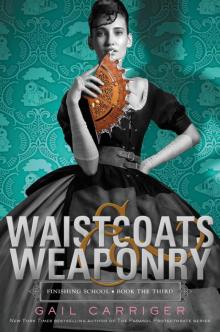 Waistcoats & Weaponry
Waistcoats & Weaponry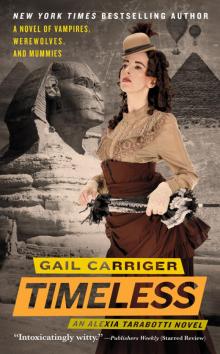 Changeless
Changeless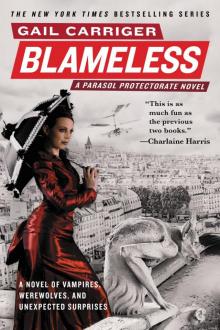 Blameless
Blameless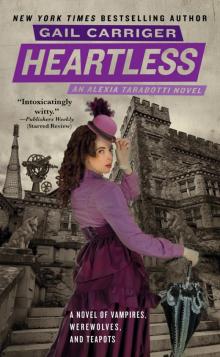 Soulless
Soulless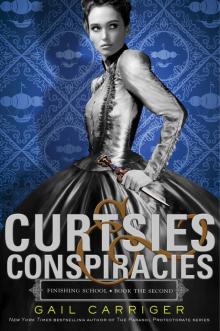 Curtsies & Conspiracies
Curtsies & Conspiracies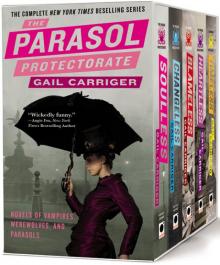 The Parasol Protectorate Boxed Set
The Parasol Protectorate Boxed Set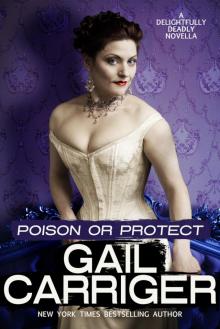 D2D_Poison or Protect
D2D_Poison or Protect Funny Fantasy
Funny Fantasy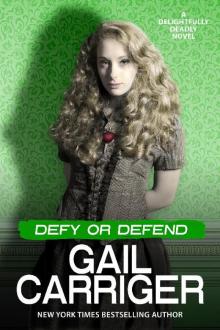 Defy or Defend
Defy or Defend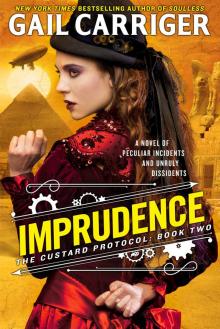 Imprudence
Imprudence Reticence
Reticence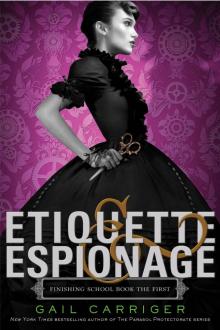 Etiquette & Espionage
Etiquette & Espionage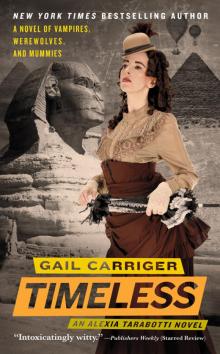 Heartless
Heartless Prudence
Prudence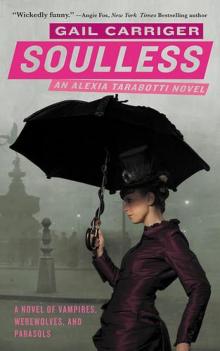 Parasol Protectorate 01 - Soulless
Parasol Protectorate 01 - Soulless Fairy Debt
Fairy Debt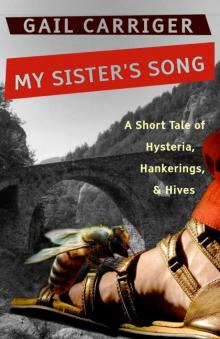 My Sister's Song
My Sister's Song Changeless: The Parasol Protectorate: Book the Second
Changeless: The Parasol Protectorate: Book the Second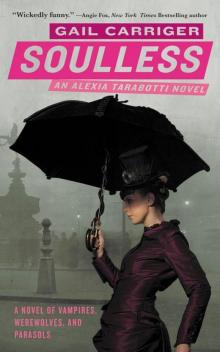 Soulless: The Parasol Protectorate: Book the First
Soulless: The Parasol Protectorate: Book the First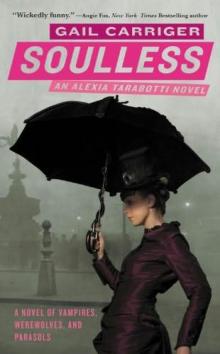 Soulless pp-1
Soulless pp-1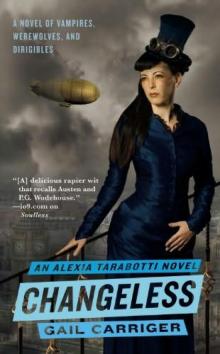 Changeless pp-2
Changeless pp-2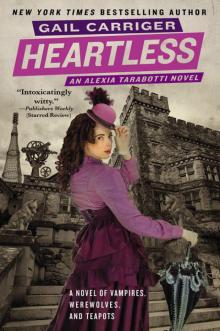 Heartless: The Parasol Protectorate: Book the Fourth
Heartless: The Parasol Protectorate: Book the Fourth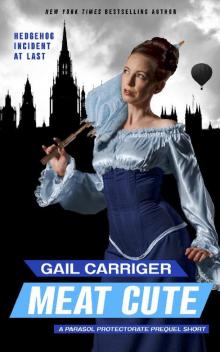 Meat Cute
Meat Cute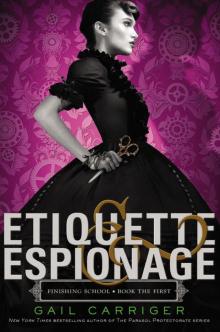 Etiquette & Espionage (Finishing School)
Etiquette & Espionage (Finishing School)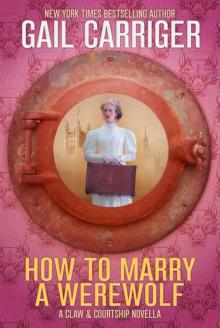 How To Marry A Werewolf (Claw & Courtship Novella Book 1)
How To Marry A Werewolf (Claw & Courtship Novella Book 1)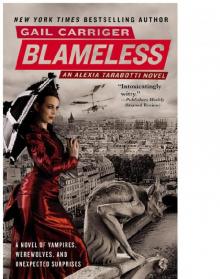 Blameless: The Parasol Protectorate: Book the Third
Blameless: The Parasol Protectorate: Book the Third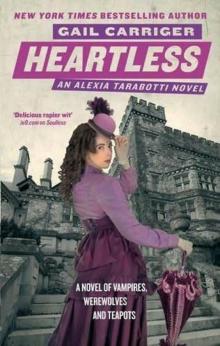 Heartless pp-4
Heartless pp-4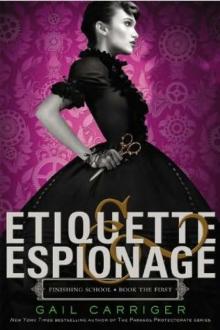 Etiquette & Espionage fs-1
Etiquette & Espionage fs-1 Romancing the Inventor: A Supernatural Society Novella
Romancing the Inventor: A Supernatural Society Novella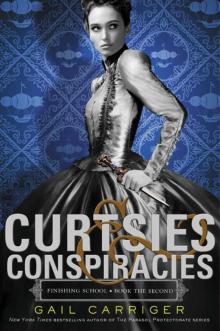 Curtsies & Conspiracies fs-2
Curtsies & Conspiracies fs-2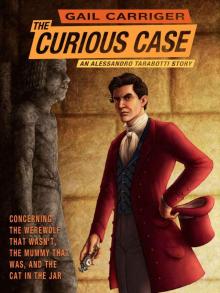 The Curious Case of the Werewolf That Wasn't, the Mummy That Was, and the Cat in the Jar (The Parasol Protectorate Book 6)
The Curious Case of the Werewolf That Wasn't, the Mummy That Was, and the Cat in the Jar (The Parasol Protectorate Book 6)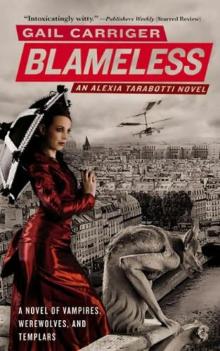 Blameless pp-3
Blameless pp-3